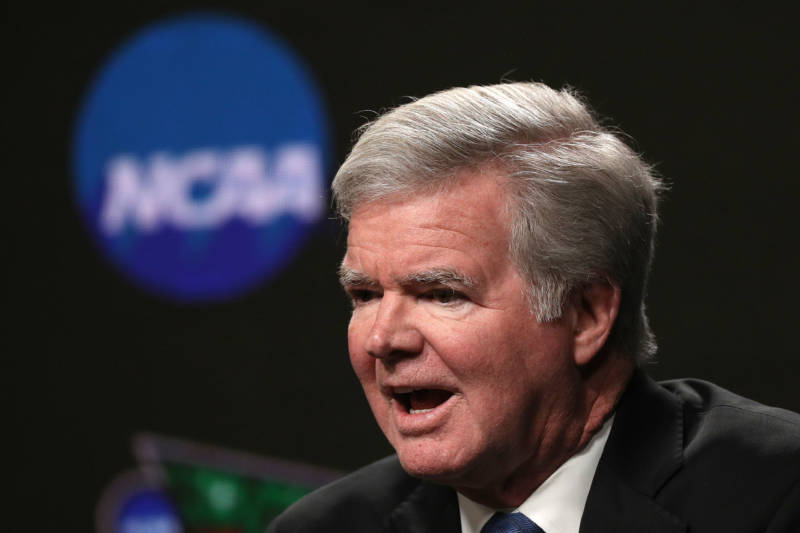Updated Monday, 5:15 p.m.
The NCAA is speaking out strongly against a bill in the state Legislature that would allow college athletes in California to sign sponsorship deals and to be paid directly for the use of their name, image or likeness.

Updated Monday, 5:15 p.m.
The NCAA is speaking out strongly against a bill in the state Legislature that would allow college athletes in California to sign sponsorship deals and to be paid directly for the use of their name, image or likeness.
NCAA President Mark Emmert said in a letter to state lawmakers that the bill could make it “impossible to host fair national championships,” and implied that if the bill is signed into law, athletes at California schools could be barred from competing in NCAA championships.
The NCAA considers student-athletes amateurs, and prohibits them from collecting any monetary compensation for their play.
The letter was sent to the chairs of two state Assembly committees and the bill’s author, state Sen. Nancy Skinner, D-Berkeley, last week. It was first reported by USA Today and obtained by KQED.
SB 206, also known as the Fair Pay to Play Act, would prohibit California’s 24 public and private colleges and universities that participate in Division I sports from preventing student-athletes from signing endorsement deals and being paid directly for the use of their name, image or likeness.
It would also bar schools from revoking the scholarship of a player who received outside compensation. If signed into law, the legislation would take effect in January 2023.
In last week’s letter to lawmakers, the NCAA’s Emmert didn’t go so far as to say California students would not be able to participate in championships if the bill takes effect. But he did say the “local differences” that the legislation could create between colleges would likely “have a negative impact on the student-athletes it intends to assist.”
Sen. Skinner said she takes Emmert’s letter as a threat.
“It’s definitely a threat to colleges,” she said.
“And this is what I think is so ironic: They are colleges. The NCAA is an association of colleges, and yet they’re threatening California colleges and saying that they would not allow them to participate in championships if my bill passes.”
The NCAA didn’t immediately respond to questions about what the organization would do if SB 206 were signed into law.
Last month, the athletic organization announced the creation of a “working group” to study how student athletes could receive compensation in a way that’s “consistent with the NCAA’s core values, mission and principles,” according to Emmert.
In his letter, Emmert asked lawmakers to postpone taking action on the legislation while the NCAA and member schools assess their rules surrounding student-athlete payment.
“Like you, the NCAA is committed to providing a fair, inclusive and fulfilling environment for our student-athletes and we recognize that reforms often are necessary to improve the student-athlete experience,” the letter reads.
“However, addressing NIL [student athlete name and likeness], must be developed and implemented in a manner that maintains the clear demarcation between professional and college sports and ensures that education remains the cornerstone of college sports and the student-athlete experience.”
Sen. Skinner, though, said that because her bill wouldn’t go into effect for another three years if it were signed into law, the NCAA would still have ample time to assess its own rules regarding student-athlete compensation.
“Both the colleges and the NCAA have plenty of time to do the right thing,” she said.
Lawmakers in the Assembly Arts, Entertainment, Sports, Tourism and Internet Media Committee are expected to consider SB 206 on Tuesday. The state Senate overwhelmingly passed the bill in May.

To learn more about how we use your information, please read our privacy policy.